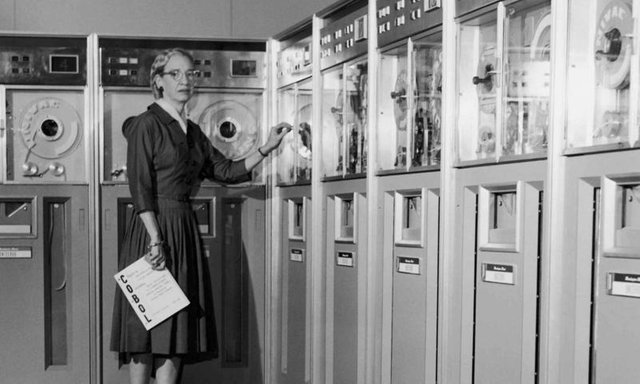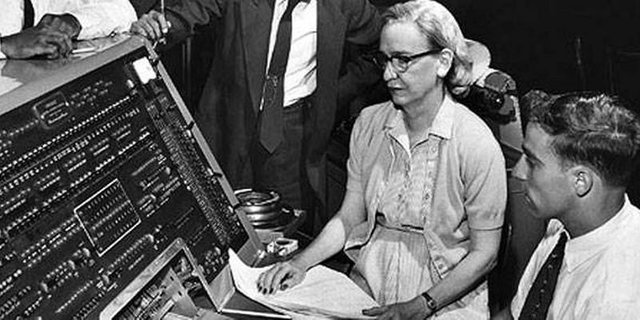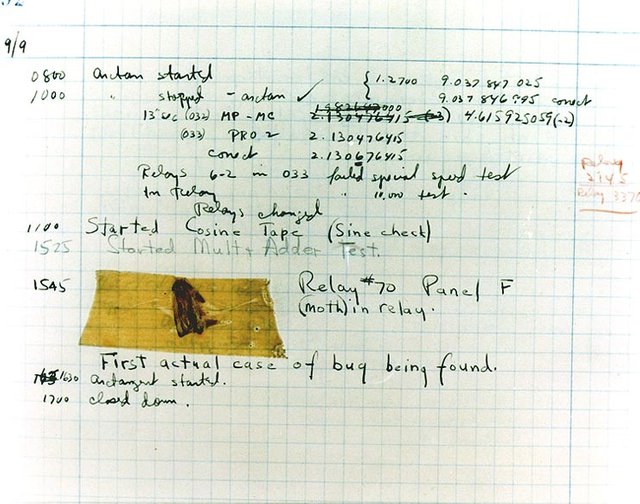Grace Hopper or the woman who defined the basics of modern computing !

While working on the long task of rebuilding my GNU/Linux environment on my second SSD, a brief thought briefly crossed my mind when I observed all the compilation processes of the packages I was installing on the AUR repository. We often forget to pay homage to his people who worked in the shadows in order to offer us devices that are now functional for the common man. Indeed, behind the graphical interfaces that illuminate our screens and make life much easier, we omit the fact that thousands of bytes are superimposed on each other using different computer languages and govern their proper functioning.
For the most part, when you think of these illustrious people who have shaped modern and domestic computing, Bill Gates, Steve Jobs, Linus Torvald and others like Steve Wozniack are well worth mentioning. But if you have to give one person all the praise he deserves on this subject, it is Grace Hopper. Dismantled to the benefit of the above-mentioned people, who are now much more popular, Grace nevertheless gave birth to the essential functions that allow a computer to be more than just an empty shell...

Born in 1906 in New York, Grace quickly became passionate about science and mathematics. This overflowing passion allowed him to gain intellectual enrichment in his preferred fields of study and ensure brilliant studies, until he obtained a doctorate in mathematics at Yale University in 1934. Not being an ambitious person and not having undertaken a long-term project, the young woman then embarked on a military career, putting her knowledge and skills to good use for her country. At the end of the Second World War, she and a team of researchers from the equally famous Harvard University worked on the development of the world's first supercomputer ever: Harvard Mark I. The first supercomputer in history.
Rather primitive in its operation, the machine was not really a computer as such, but rather an electromechanical unit that carried out instructions using punched cards, previously designed and programmed. Despite its archaic operation, Grace and her team's prowess made it possible to make the use of the machine fully operational and extremely reliable.

Faced with such a feat, it wasn't long before this brilliant spirit was courted by firms specialized in new technologies. This was indeed the case in 1949, when EMCC, Remginton Rand's computer and scientific arm, hired Ms. Hopper to create a functional computer for the professional market. Named UNIVAC 1 for the occasion, it offered few possibilities and was doomed to failure, as its programming required special skills. Grace was facing a major challenge here. The aim is to democratize the use of such devices so that they are not only accessible to experienced scientists. Driven by the desire to simplify the task and democratize the use of computers, Grace set herself the challenge of creating from scratch, a tool that would translate binary commands into instructions that could be deciphered by the machine's components. The achievement of this vision took shape after three years of work, with the advent of the first compiler, dedicated to UNIVAC 1.
A compiler is, in computer science, the term used to designate a program that transforms a source code written in one programming language (the source language) into another computer language (called a target language)1. So that it can be exploited by a machine, the compiler translates the source code, written in a high level abstraction language, easily understandable by humans, into a lower level language, an assembly language or machine language. Conversely, a program that translates a low-level language into a higher-level language is a decompiler.
Source wikipedia.
A first historical first in the computer world, since we have a compilation program (B-O) that translated the commands into numerical format and English, into a programming language understandable for the processor... The foundations of modern programming languages were laid and forever changed the approach and the realization of software, in this sector.... Funny little fact: It will popularize the term bug, writing a report that reported an error generated by the machine...

I could have talked to you about a lot of other things about it, but I preferred to dwell on and develop more specifically this aspect, which we never talk about enough. The designers, programmers and other coders are today the heirs of this great lady who has offered to the world, the beginnings of modern computing, at the service of each and every one of us. So, when you see a line of code appear or when you use your personal computer, have a thought for Grace. There is a little bit of it in every data available!
"Humans are allergic to change. They love to say,"We've always done it this way." I try to fight that. That's why I have a clock on my wall that runs counterclockwise." Grace Hopper
Thanks for sharing i will done up vote I always see your post. And follow you
New generations of developers should thanks this women for inventing compilers !
We would not have done such high quality programs without this tool :p